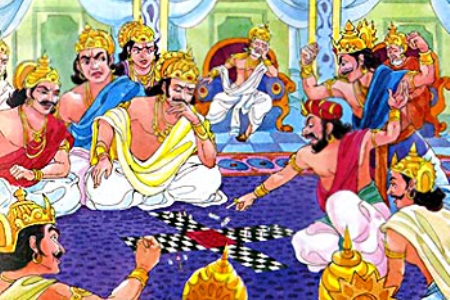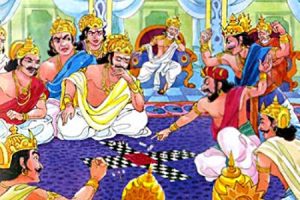Gaming
Lessons of Gambling Regulation from the Mahabharata

Indias archaic gambling laws penalise gambling in a common gaming house. Though the Central Public Gambling Act of 1867 and other state Gaming Acts have been severely criticised because they have failed to keep up with the changing times, lawmakers have remained oblivious to the changing times and aspirations of the society.
The Federation of Indian Chambers of Commerce and Industry (FICCI) has been championing the cause of legalising sports betting and their efforts have gained momentum after the recent IPL bookmaking and fixing scandal revealed the futility of Indias gaming and betting laws. FICCI would be organising a comprehensive conference to urge the government to legalise sports betting on 12th and 13th October 2013 which expects participation from top jurists, industry experts and gaming lawyers.
The main arguments in support of this proposition that is also likely to be taken up by panelists in the conference is that such a move would earn the government at least Rs. 12,000-19,000 crores of annual revenue as it would bring the large underground market mainly controlled by criminal syndicates to the mainstream. Additionally FICCI argues that such a move would also dry up the funds of underworld syndicates as betting is one of their major business operations at present. They further claim that gaming regulation and transparency in betting activities would to a large extent help check fixing and cheating in sport.
While these arguments indeed appear attractive, FICCIs efforts have at best received a lukewarm response from politicians. One of the main reasons why lawmakers cutting across party lines are hesitant to liberalise the gaming sector is the perceived moral, religious and social repercussions of such a decision as well as negative public perception.
The clichéd episode in the Mahabharata when the king of Dharma, Yudhistira lost everything including his kingdom, brothers and wife in a game of dice to his uncle Shakuni is used to highlight the problems of gambling addiction and ensure that gambling never gets regulated in India.
In fact, the judiciary also has used Mahabharata to justify the prohibition of gambling and allied games terming it as res extra commercium, outside the fundamental right to free trade and commerce guaranteed by the Constitution . The Mahabharata deprecates gambling by depicting the woeful conditions of the Pandavas who had gambled away their Kingdom writes Chief Justice Das in the landmark The State of Bombay v. RMD Chamrbaugwala Supreme Court decision (1957). Various other recent judicial decisions have cited with approval this line of thinking.
However a deeper examination of the Mahabharata and other ancient religious texts reveals that this statement is not entirely true. Gambling was neither frowned upon nor considered immoral by ancient Hindu culture. Gurcharan Das through his authentic research on the Mahabharata claims that playing dice was part of the ritual and imperial consecration required of the king in the Vedic rajasuya ceremony.
Religious texts accept gambling as a social reality and have never entirely prohibit and criminalised it, though many Rig Vedic verses and comments by jurists like Manu and Kautilya frown upon ill effects of gambling addiction.
Now consider the gambling chapter of the Mahabharata being played out in a modern-day regulated market where gambling was permitted and monitored by an independent agency. It would be safe to assume that dice and other gambling equipment would be strictly scrutinised to ensure fairness for all participants and measures would have been taken to prevent addiction. Indeed such is the role played by Gaming Commissions in the United Kingdom and many other European countries.
Thus, a regulated and fair dice game in Mahabharata would not only have ensured that cheating in the dice game is investigated and Shakuni punished, but the ensuing war and destruction of families would also have been prevented. Indeed the epic would not have played out and there would have been a happy ending if only there was regulated gambling with appropriate regulations.
However, history as they say is a great teacher and hence the Mahabharata episode should not be discounted. Rather, the important take away from the entire episode is that gambling is part of the human instinct (including the king of all virtues and dharma, Yudhishtira) and the only way to deal with the inevitable vice of gambling in society is to transparently regulate it, punish cheating and earn revenues through proper taxation.




















Bharat Agarwalla
October 1, 2013 at 1:01 am
Interesting article. Infact I have often referred to gambling being an age old form of recreation and mentioned the game of Chaupad (also called Chausar) which was said to be the game where Yudhishtir is said to have lost all his wealth and belongings including his empire and bothers and also his wife.
But I would add here that mostly everywhere where we read about gambling in various forms are said to have been indulged in, it has been by the Kings, or rulers, or chieftans of Thakurs or the local Chouduries and interesting all of them are the community which ran the show or ruled the place. No where do we ever read that the common man indulged in it or that the business or the trader community indulged in it.
But with time and evolution of recreation industry, it has been seen over the last century where gambling has become a form of entertainment and recreation. I agree it should be indulged in a regulated method.
Gambling addition or the lure to win back what one has lost one keeps increasing his stakes and in the process gets dragged deeper into it more often like it happened with Yudhishtir.
I would add that cheating is one thing one has to also take into consideration. Cheating can be of many types. Like say simply rigging the equipment of play and the clasic example is again Yudhishtir where he lost to the hands of Shakuni (Maternal Uncle of Duryodhana and not of Yudhishtir) who knew how to set the dice. Few other forms of cheating are also there where one say borrows to gamble more and more and then is unable to pay up his dues like Yudhishtir gambled away his brothers whom he technically dint own or also his wife Draupadi whom he owned just a fifth of while other four brothers owned his remaining 80%. There is a huge list of people who borrow and default and do not pay up even when they have money. There is no watch on this and such players are still allowed to be in the industry while they should be barred by various associations who are mute even though they are aware of it all. Likewise there is another form of cheating which is of the taxes. Most players do not account for their losses or their profits from gambling. Another thing which needs to be regulated is that the facilitators who helped the casinos get their clientele in the days when the industry was not even having a handful of players are now being hounded by plague and the Govt is gunning for them thru various forms of prosecution while the show was has benefited only the venue as they controlled the entire show like it happened at the time of Mahabharat where while Shakuni “helped” Duryodhana to beat Yudhishtir in the game of Chaupad while Dhridrashtra (father of Duryodhan) sat blindly while all this happened and so did Bhishma who dint interevene to stop all the injustice when Duryodhana instructed his brother Dushashun to outrage the modesty of Draupadi whom he has just won in the game.
The evils of gambling are way to many while regulation can only partially help in it unless it is completely regulated say by fixing how the odds are set for say a Slot Machine or the maxing or capping the commission in various games and making sure no other additional charges are levied and the watchdog keeps a watch on the activities closely. The moment such restrictions are imposed then the business of running a casino wold no longer be “as attractive” as the operating costs for then are high and would force a few more casinos to shut down and result in the stronger ones to grow bigger and the weaker ones to shut down. This means that the state would get lesser revenue and like wise lesser state taxes and also lesser central taxes.
An interesting article to read is at http://www.dnaindia.com/lifestyle/1895379/report-to-have-or-not-to-have-casinos-existential-dilemma-facing-goa-and-goans. This article shows how the industry is flouring right now with crazy profits each day while it wont be so if too much regulation would be there becoz viability to run a casino wont be there if things get too strict as becoz the article says each off shore casino earns Rs 1.75 Crores net profit each day which means over 500 crores in the full year and this means Income Tax alone should be Rs 150 crores from each of them on the bare minimum side. The article speaks of the poker tournament which the casino ran which generates a paltry tax of 10 lacs. In the past also the casinos ran various tournaments using various brands as marketing agents which were later discontinued as they knew they no longer needed the marketing efforts of outsiders anymore.
The casinos infact give employment to so many directly and indirectly and also increase tourism in a big way and hence further help the state in every manner.
The regulation of the industry needs to be coupled with the tax systems (all including income tax) to be made rationalised in such manner that it encourages fair play by one and all.
It would be interesting to see what the FICCI is able to do about it. Glaws has been a big boon for the industry (for players and casinos) and will help the industry immensely. Please keep the good work going and also keep educating the public about the vices of gambling so that they dont go overboard like Yudhishtir and lose everything they own or convert to cheats.
Jay Sayta
October 1, 2013 at 9:05 am
I agree almost completely on most of the points, thank you Mr. Agarwalla.
Pingback: Mahabharat misses an opportunity to highlight gambling as a social problem! | Vida Manejo